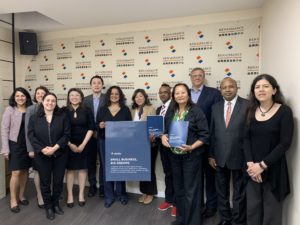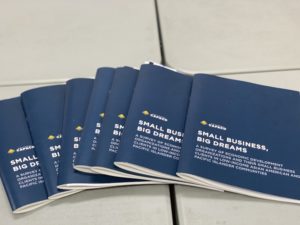FOR IMMEDIATE RELEASE
Media Contact: Nahida Uddin, National CAPACD, (347) 283-1757, nahida@nationalcapacd.org

National CAPACD’s Small Business, Big Dreams introduced at policy roundtable
The National Coalition for Asian Pacific American Community Development (National CAPACD) introduced its latest report Small Business, Big Dreams at a roundtable discussion in Flushing, NY last Friday. Flushing is one of the nation’s most diverse commercial districts with many thriving Asian American owned businesses. The event was held at the offices of Renaissance Economic Development Corporation (REDC), one of the nine National CAPACD member organizations profiled in the report. Congresswoman Grace Meng (D-NY) attended and discussed policy priorities to address the needs and challenges highlighted in the report.
Congresswoman Meng noted “Small business is a priority for me because I represent a vibrant district built by small businesses. Reports like these are so important for policy makers because we are not the experts, and we look to you for critical data. Today is not just about the unveiling of this report, but a mandate to take recommendations back to Congress for legislative action.”

Congresswoman Meng provides remarks
Seema Agnani, Executive Director of National CAPACD provided an overview of the report, noting that National CAPACD produced it to tell a more accurate and nuanced story about Asian American and Pacific Islander (AAPI) business owners in low-income communities. Small Business, Big Dreams combines analyses of both federal data and original data collected through surveys of member organizations and the small business owners they serve. The report outlines their challenges and needs and the innovative strategies deployed by local organizations to create economic opportunity and preserve AAPI neighborhoods. With some 2 million AAPI-owned businesses in the U.S. today, half of which employ fewer than 20 people, entrepreneurship is an important asset building pathway for this community.
National CAPACD Executive Director Seema Agnani shared “AAPI immigrants start businesses at a higher rate than the general U.S. population. Yet, the AAPI entrepreneur community faces significant barriers to starting, expanding, and operating their businesses. For example, there is an overreliance on friends and family for advice and access to startup capital because of a distrust of mainstream financial institutions. Fully 66% of National CAPACD members overall do not receive any small business-related funding or technical assistance from federal agencies. The remaining 34% receive federal funding to support small business programming from the Small Business Administration or the U.S. Treasury’s CDFI Fund program.”


REDC’s Managing Director Jessie Lee and the Business Center for New Americans’s Executive Director Yanki Tshering, from two of the nine groups profiled in the report, noted the lack of access to capital and limited English proficiency as two major barriers to AAPI entrepreneurship. They also highlighted displacement as an urgent issue confronting the community nationwide and called for as greater investment in the Small Business Administration and Treasury’s CDFI Fund program to address the pressing needs of this community.
Natalie Abatemarco, Managing Director, Citi Community Development and Inclusive Finance discussed long-term support of National CAPACD and other groups working on the racial wealth gap. She also highlighted Citi’s work to promote employee-owned business models as a means to preserve minority-owned businesses and community assets.
“Neighborhoods are built and run on small businesses with a track record of success that are employing local residents with good jobs,” said Natalie Abatemarco. “At Citi, we aim to help retain and preserve those businesses, especially those in lower-income neighborhoods that are under threat of displacement.”

The report highlights nine National CAPACD members: Asian Economic Development Association, Asian Pacific Islander Small Business Program, Asian Services in Action, Business Center for New Americans, Center for Pan Asian Community Services, Pacific Asian Consortium in Employment, Pacific Island Knowledge 2 Action Resources, Philadelphia Chinatown Development Corporation, and Renaissance Economic Development Corporation.
Download the report here.
###
